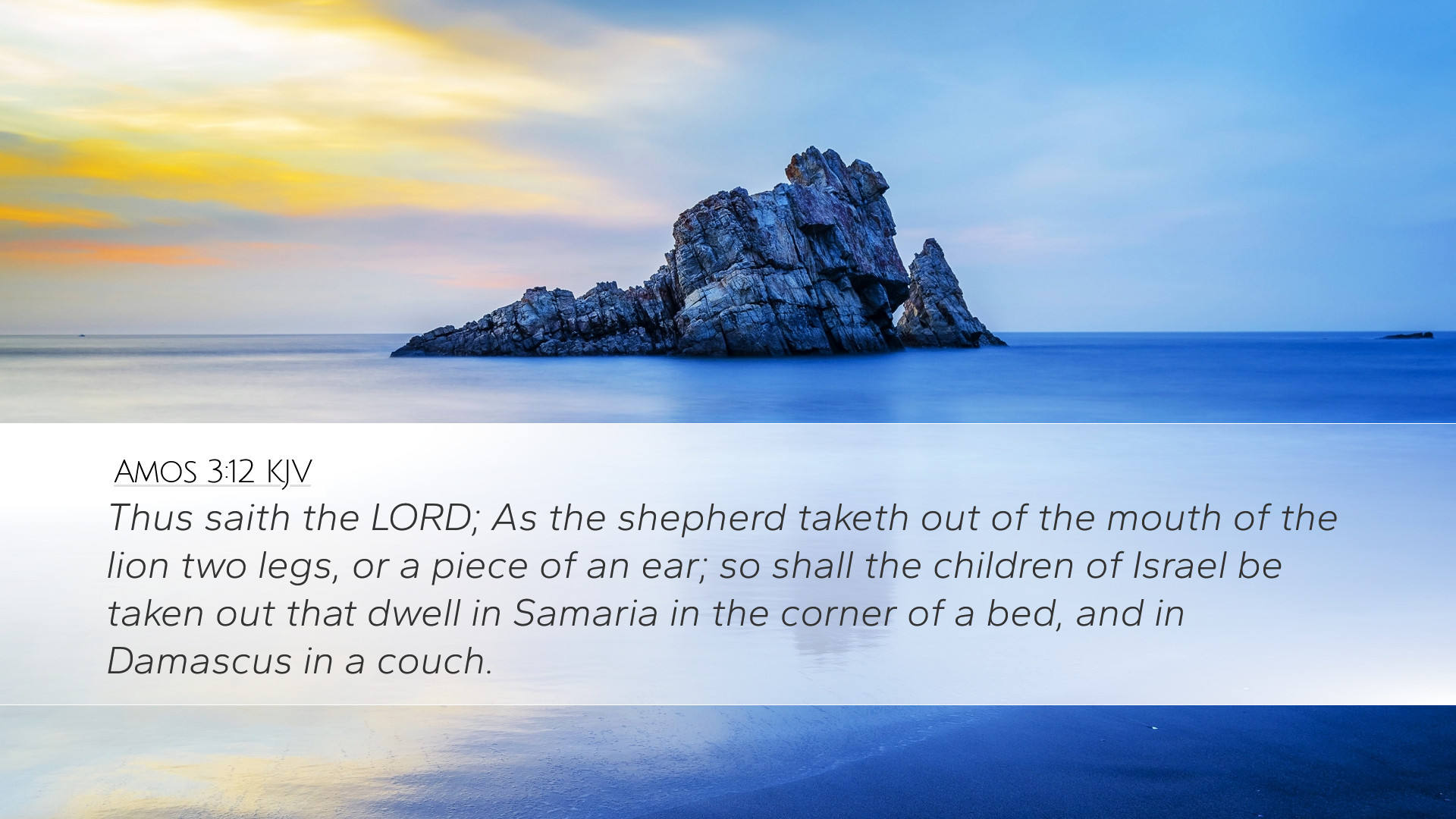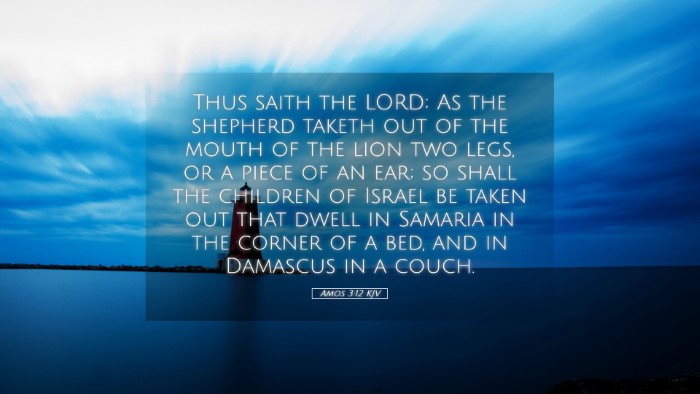Old Testament
Genesis Exodus Leviticus Numbers Deuteronomy Joshua Judges Ruth 1 Samuel 2 Samuel 1 Kings 2 Kings 1 Chronicles 2 Chronicles Ezra Nehemiah Esther Job Psalms Proverbs Ecclesiastes Song of Solomon Isaiah Jeremiah Lamentations Ezekiel Daniel Hosea Joel Amos Obadiah Jonah Micah Nahum Habakkuk Zephaniah Haggai Zechariah MalachiAmos 3:12
Amos 3:12 KJV
Thus saith the LORD; As the shepherd taketh out of the mouth of the lion two legs, or a piece of an ear; so shall the children of Israel be taken out that dwell in Samaria in the corner of a bed, and in Damascus in a couch.
Amos 3:12 Bible Commentary
Bible Commentary on Amos 3:12
Amos 3:12 states:
"Thus saith the Lord; As the shepherd taketh out of the mouth of the lion two legs, or a piece of an ear; so shall the children of Israel be taken out that dwell in Samaria in the corner of a bed, and in Damascus in a couch."
Exegesis and Context
The Book of Amos serves as a critical voice during a time of prosperity in Israel, which paradoxically led to spiritual complacency. Amos, a simple shepherd and farmer called by God, conveys a sobering message of judgment against the northern kingdom of Israel and other nations.
Key Themes in Amos 3:12
-
The Lord's Sovereignty:
The phrase "Thus saith the Lord" underscores God’s authority in delivering messages through His prophets. This establishes the condition of divine judgment and emphasizes that the message is not merely human opinion but God’s own declaration.
-
The Shepherd Imagery:
The imagery of a shepherd retrieving remnants from a lion highlights both the danger that Israel faces and the mercy of God. As a shepherd rescues what remains from a predator, so God promises to preserve a remnant of Israel despite impending doom.
-
Judgment In Proportion:
The specific mention of "two legs" or "a piece of an ear" stresses the minimal survival that remains. This indicates the severity of the destruction to come; only a scant few would escape the judgment and suffering that God has decreed.
-
Location of Judgment:
The reference to "Samaria" and "Damascus" alludes to the places of wealth and idolatry, which contrast with their impending judgment. It signifies that even in places of comfort and false security, God's judgment will reach.
Insights from Commentaries
Matthew Henry's Commentary
Matthew Henry observes that this passage illustrates God's care for His people even in judgment. He emphasizes that although much of Israel will fall, a remnant will be preserved, symbolizing hope amidst destruction. He points out that the remnants retrieved by the shepherd are evidence of the complete devastation that will affect the nation.
Albert Barnes' Notes on the Bible
Barnes elaborates on the metaphor of the shepherd and the lion, stating that it represents the fierce nature of God’s judgment that will befall Israel. He highlights that the "two legs or a piece of an ear" symbolize the severe losses that will occur, demonstrating that while some may be salvaged, most will perish. Barnes also comments on the phrase "those who dwell in Samaria," indicating their luxurious comfort at the time which stands in stark contrast to their spiritual state.
Adam Clarke's Commentary
Adam Clarke provides a detailed analysis of the societal state in Israel, emphasizing the moral decline that has led to God's impending judgment. He notes that by mentioning 'Samaria’ and ‘Damascus’, Amos positions the text within real geographic and historical contexts, inviting readers to grasp the magnitude of the warning. Clarke discusses the implications of the remnant, suggesting that it points toward God’s relational fidelity despite human failures.
Theological Implications
Theologically, Amos 3:12 invites discussion on the nature of divine judgment and mercy. It challenges believers to reflect on the concepts of sovereignty and salvation while grappling with issues of complacency within the church.
Notably, this passage stands as a reminder of God’s ability to deliver a remnant, signaling hope and continuity of His covenant, even when great judgment looms. Furthermore, it invites pastors and theologians to discern their congregations' spiritual health and seek genuine repentance and reliance on God.
Conclusion
Amos 3:12 provides profound insights into God’s character, His judgments, and His relationship with His people. For pastors, students, and scholars alike, it serves as both a warning and a source of hope, motivating an earnest reflection on the state of personal and communal faith in light of the tendencies towards complacency in times of prosperity.


